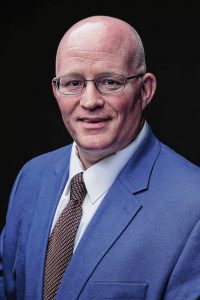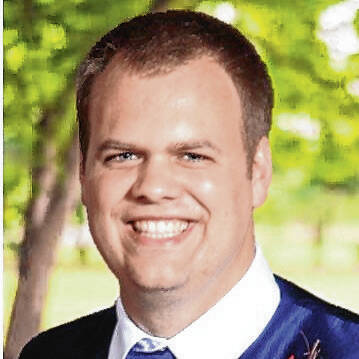Bartholomew Consolidated School Corp. has decided to work with an outside partner on strategic work to enhance relationships between teachers and students at the middle school level.
The school board voted Monday to provide permission for BCSC to participate in Search Institute’s Cultural Adaptation of Developmental Relationships in Education (CADRE) project. The vote was 5-2, with Logan Schulz and Jason Major voting against the proposal.
Major said he would have preferred to table the matter to provide more time for board members and community members to get their questions answered before a vote.
“We owe it to them to just make sure we really understand this before we implement it,” he said.
In describing the project, Superintendent Jim Roberts said that Search was looking for a corporation with two middle schools so that comparisons could be drawn between the two schools.
“One of the two middle schools will be identified as the school that is working with staff and students to develop gaps or opportunities to work on improving developmental relationships,” he said. “The other school would not.”
He did not indicate whether Central or Northside middle school will be the initial participant.
According to Search Institute documents that the school corporation shared with The Republic, “The Cultural Adaptation of Developmental Relationships in Education (CADRE) project is a partnership between your school and a research organization called Search Institute to strengthen developmental relationships between teachers and students. Developmental relationships are close connections through which young people discover who they are, cultivate abilities to shape their own lives, and learn how to engage with and contribute to the world around them.”
CADRE is described as both a research study and a professional development opportunity. The participating school will form a team of six to 10 individuals, including educators, support staff, students and community members. The institute will work alongside this team to identify the strengths and needs of the school in order to “co-develop a plan for strengthening equitable approaches to relationships in your school.”
“Search Institute will also learn from you how to improve upon CADRE for future iterations,” Search officials stated.
There are four phases to the project:
- Fall 2023: The school team works with the Search Institute to identify “the strengths and needs related to equity and developmental relationships in the school.”
- Spring 2024: The school team co-designs a school-wide implementation plan to address these strengths and needs.
- Fall 2024 to spring 2025: The plan is implemented.
- Fall 2025: A sustainability plan is developed, and the implementation plan “undergoes a continuous improvement process.”
The first three phases include the following activities: completing lessons in the learning management system LearnWorlds, meetings with Search, and participation in interviews and surveys. During the final phase, there will be monthly school team meetings and the school will work to support the implementation plan and its sustainability. Activities for CADRE will not exceed five hours per month.
Search materials designate the middle school that initially participates in CADRE as “School A.” The other school — School B — will complete surveys and interviews from spring of 2024 to spring of 2025 and is expected to begin CADRE in fall of 2025.
School board member Dale Nowlin asked if the participation of “School B” in CADRE would depend on the results at “School A.” Roberts confirmed this would be the case.
According to Search, school districts that participate in CADRE receive $10,000 per year for the participating school and “additional stipends for participating staff and students.” BCSC officials have not indicated whether Northside or Central will be the initial participant in the project.
Several individuals discussed CADRE during the time for public comment. Some spoke in its favor, including Columbus Area Chamber of Commerce President Cindy Frey, who is a member of the Council for Youth Development’s steering committee.
Frey said she is familiar with Search and its “evidence-based approach to help all young people thrive.” Other supporters said that gathering data will help school officials figure out the best way to help youth.
However, other speakers expressed skepticism or opposition, citing concerns such as a lack of available information on the project, how data might be used, Search Institute’s alleged views on gender ideology and racism, and a previous survey conducted in collaboration with Search.
In September, students in grades 4-12 in both BCSC and the Flat Rock-Hawcreek School Corp. were given the option to participate in a survey titled “Resilience Through Strengths.”
The survey was part of a larger project known as the Resilience Through Strengths community pilot. In January 2021, the Council for Youth Development, the Indiana Department of Education and local school officials announced that Bartholomew County would be a pilot in international efforts to study and enhance youth development.
The county joined an international research team led by the International School Psychology Association, the International Institute for Child Rights and Development, Search Institute, IUPUI’s School of Education and the Indiana Department of Education. Local leaders worked with the team to study whether asset-based practices “reduce the effects of childhood trauma and improve youth resiliency.”
CYD officials have said that the findings from the pilot phase of this project will establish “proof of concept” for an international initiative on child well-being based on Search Institute’s developmental assets and developmental relationships frameworks.
During the 2022 BCSC school board elections, some candidates criticized the content of the survey — such as questions around sexuality and gender identity — and the school corporation’s level of communication about it.
“Any surveys that would be given in this particular instance, that would be developed, would be developed internally as a team in the school, so the survey questions would be based upon the needs that are identified through a strategic planning process,” said Roberts, in regards to CADRE.
He added that both middle schools will take the same evaluations so that comparisons can be made, and survey participation will be optional for students.
Schulz, who was one of the candidates to express concerns about the Resilience Through Strengths survey, said he has questions about CADRE, including how data might be used or shared. He also felt that the community should be provided with more information on this topic in order to better facilitate public comment.
“I don’t think there’s any question about the mental health crisis that we do have,” he said. “However, we had two varying different groups here with public comment. It appears one’s closer-knit to the Council for Youth Development, has honestly additional information that the public, if they had access to it, may share a very common opinion.”
Board member Todd Grimes, who is a teacher in the Greenfield-Central Community School Corp., said that he voted in favor of CADRE for a number of reasons.
“Probably the biggest of which is after 31 years as an educator myself and seeing kind of the ebb and flow and changes in the world of education over the years, things have changed considerably in the last few,” he said. “They’ve been thrown upside-down. And I think anything that can be done to promote and stimulate thought about thoughtful, intentional developmental relationships, the better off that we’ll all be.”
 Jason Major BCSC School Board candidate District 1 Mike Wolanin | The Republic
Jason Major BCSC School Board candidate District 1 Mike Wolanin | The Republic





